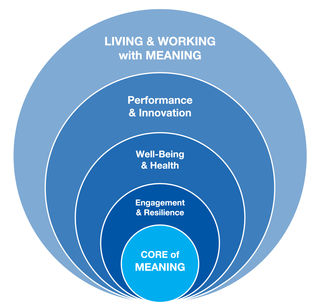Health
Why Put Meaning First?
The search for meaning has become a megatrend.
Posted December 1, 2018

The search for meaning is a megatrend of the new millennium. Other things being equal, people whom I would describe as living and working with meaning as their primary source of motivation are more passionate, more engaged, and more resilient than those who are unaware of the need for meaning or those for whom meaning is not a targeted destination on their life path. Against this backdrop, let’s take a look at some of the likely benefits from the commitment to put and keep Meaning First in everyday life and work.1
Engagement & Resilience
To be engaged means to be involved with and connected to a certain activity, to the people who surround you, or more metaphysically, to your true nature or core essence. Conversely, to be disengaged means to be disconnected from the activity, other people, and/or your true nature.
In many workplaces around the world, leaders complain about people with whom they work as being disengaged from and disinterested in the work they are doing and in other people. Metaphorically-speaking, I’ve observed many workplaces over the years where, like a scene from the M. Night Shyamalan supernatural film, The Sixth Sense, “I see dead people!” Although there are employers who have attempted to implement so-called engagement programs in their organizations, more often than not these initiatives fail because they do not address the real underlying issue: the lack of connection to the true meaning of the work. In this regard, employees want to feel that their work matters to them and to others (co-workers, customers, citizens, and the broader society). Employees also want to challenge themselves to discover new sides of themselves, to discover new talents, new viewpoints.
In a broader sense, I’ve also been witnessing a noticeable lack of engagement in our neighborhoods, cities, and societies as a whole. People tell me that they want to connect meaningfully with others. Yet, I am finding that people feel lonelier than ever before and, sadly, feel that they have very few people with whom to talk openly and share their “real lives.” Moreover, I’ve found that the more time people spend interacting with their electronic devices, the less time they spend in face-to-face contact with others and the lonelier they feel. We must remember that our relationships are built one conversation at a time, and every interaction is an opportunity to strengthen or weaken meaningful connections with others. Against this backdrop, we must remain vigilant and make the effort to counterbalance all the potentially false connections made online in the “virtual” world.
To be resilient means to be flexible, capable of adapting to and quickly recovering from difficulties or change. The nature of life is change but we often resist this fact of life, wanting things to remain the same, trying to design and control our lives and surroundings so that change does not happen. But the status quo is yet another illusion because even if we want to stand still, everyone and everything else around us are changing. Let me suggest that if you want things to stay the same, then something is going to have to change! Life can not be pre-programmed, for it flows like a river, twisting and turning, changing at different rates and often unexpectedly, sometimes appearing more stable, while at other times, tossing us around in the turbulent rapids. We can try our best to hold onto the sides of the river of life to resist the flow, dreading or fearing change but, in the end, we know that life requires us to surrender to the forward motion and “go with the flow.”
Well-Being & Health
Many illnesses are the result of stress and anxiety which, when left untreated, start to negatively affect the body, as well as the mind and spirit. One of the challenges of modern medicine is that we often treat the symptoms of an illness but fail to address its root cause(s). For various reasons, physicians today have little time to see each patient and even less time to ask about lifestyle or stress and the broader connection between the patient’s spirit, mind, and body. Instead, more often than not, they are forced to focus primarily on relieving symptoms and managing diseases quickly through drugs or surgery.
The vast majority of our health care budgets are spent on treatment versus prevention. If stage 1 is being healthy, stage 2 is having stress and blocked energy, and stage 3 is illness, most people wait until they are in stage 3 to react and then want quick fixes for their illnesses. If we focused on the prevention of illness and, in particular, on stages 1 and 2, we would not only be healthier (individually and collectively), we would save billions of dollars in health care costs. Just as we actively prevent car accidents by encouraging people to take driver’s education classes, and just as we brush our teeth to prevent cavities, we can learn to take a more proactive approach to our general health and well-being by focusing on the prevention of illness.
Plato wisely said, “the part can not be well unless the whole is well.” Health and well-being must start from the core of meaning. When we are engaged in meaningful activities that we enjoy, when we feel that we matter and what we do matters, and when we tap into our optimistic, positive spirit, energy can freely flow within us, through us, and to others. Conversely, when we are engaged in activities that are meaningless to us, when we feel that we are not living and/or working authentically, or when we are overwhelmed with anxiety and stress, we lack the connection to our true essence and, therefore, suffer from a lack or void of meaning. Energy ceases to flow smoothly and energy blockages can eventually show up in some form of illness or dis-ease. Everything, as Plato also said, is interconnected. Meaning gives energy and power to our desires and intentions and, as a consequence, helps us live healthier, more holistic lives.2
Performance & Innovation
Often, especially in the workplace, leaders and managers will ask for higher levels of performance, creativity, and innovation from their team members. Often these requests are ignored or discounted by employees, who already feel that they are contributing more than their fair share and perhaps are suffering from high levels of “burnout.” Even if some employees have good intentions, often they feel that they just can’t do any more than they are already doing.
People want opportunities at work to express their creativity and to be appreciated for their creative contributions. Importantly, they also want to express who they truly are and who they want to become. In their work lives, they don’t want to have to leave their spirit at the front door in order to “fit in” and, as a result, possibly lose their identity, sense of self-worth, and humanity. In short, they want to make a living but, at the same time, they also want to make a life.
If everyone understood the “Core of Meaning” concept with its implications for engagement & resilience, well-being & health, and performance & innovation, not only would our work but also our lives would be much more engaging, enjoyable, and fulfilling. It’s easy to see why the Search for Meaning, guided by the need to put Meaning First, has become a megatrend in today’s complex world.
References
1. For more on the “return on investment” from putting Meaning First, see: Pattakos, Alex and Dundon, Elaine (2017). Prisoners of Our Thoughts: Viktor Frankl’s Principles for Discovering Meaning in Life and Work, 3rd ed. Oakland, CA: Berrett-Koehler; and Pattakos, Alex and Dundon, Elaine (2015). The OPA! Way: Finding Joy & Meaning in Everyday Life & Work. Dallas: BenBella Books.
2. Alex Pattakos and Elaine Dundon, “Why Am I Here? Your Personal Answer to the Ultimate Question,” Complete Wellbeing, Vol. IX, Issue 01, November 2014, pp. 36-46.




